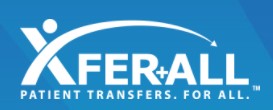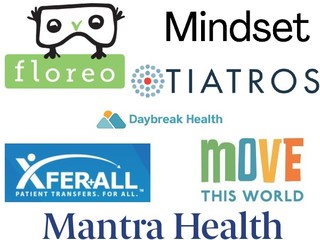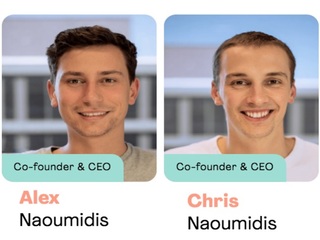
One of the most exciting parts of every Vator event is the startup showcase; we’ve been showcasing some of the most promising startup companies for many years now, and we’ve identified some very successful companies early on that have gone on to raise big funding rounds.
At this year’s Future of Behavioral and Mental Health event, held on Wednesday, we had seven extremely promising companies present, and they ranged from startups tackling mental health gaps in education and in teens, to those working with HR departments and hospital transfer workers.
The showcase was emceed by Mark Goldstein, Chairman at UCSF Health Hub. Joining us as judges were Kevin Lynch, investor at MGV, and healthcare executive Nico Arcino.
 Daybreak Health, a company that specializes in providing online counseling services specifically for teens, helping to stabilize their mental fitness.
Daybreak Health, a company that specializes in providing online counseling services specifically for teens, helping to stabilize their mental fitness.
“We look at the 10 million teens in the US alone that are struggling with mental health needs and that was pre-pandemic. During the pandemic, there have been reports that 50% of parents have reported new or growing needs from their teens with regards to mental health. So, that’s the problem we’re trying to solve at Daybreak Health,” said Alex Alvarado, CEO of Daybreak.
The company identified three main problems with adolescent care: one being that access looks really different for families.
“The most important thing to understand about access when you’re working with teens is that parents have to engage. And, unfortunately, right now, we’re in a situation as a society where parents are a little bit behind on the educational awareness curve when it comes to mental health for their teens. And that’s the first thing that we need to solve in order to get teens the care they need,” he said.
“In addition, funding for adolescents looks totally different than the adult market, and we’ve heard from a lot of great folks today that are going after the employer space and that doesn’t really work when you’re trying to reach teens.”
Second is the lack of family-centered care models, as opposed to all of the care models for single individuals or adults. And, third, that the adolescent care ecosystem is fragmented, even more so than the adult ecosystem.
“As an adolescent, you might be getting care at school, you might be getting care from your pediatrician, which is most of the time where parents are going to start, you might then go to a therapy office and you might also get referred to a psychiatric office and all of those are not going to be working or coordinating together,” said Alvarado.
To solve these problems, Daybreak is building a digital mental health clinic for adolescents, which includes three layers: family awareness and education, family-centered counseling services, and then medication management. The company offers free classes for parents, as well as digital assessments for teens and parents. The family-centered counseling services include a personalized counselor match, evidence-based treatment plan and measurement based care. Parents are given coaching, and family therapy when its needed.
The company is also solving this through it’s go-to-market strategy, which involves building community partnerships.
“I talked about that fragmented ecosystem in adolescent care; it’s really, really important to integrate and work well with where kids are already getting their care today, whether that’s at the school, whether that’s with pediatrics. So, we’ve built partnerships in both of those areas,” said Alvarado.
The second part of that strategy is around how the company is paid, which is different from how adult care is covered.
“It’s not just private insurance, it’s not employers, you really have to think about public funding, school districts, and Medicaid. 40% of kids are on Medicaid in the United States, and so you really can’t build a solution without going down that route and that’s the direction Daybreak is heading, building on the great school partnerships that we’ve built in the early days.”
Ultimately, Alvarado said, the mission at Daybreak “is creating a world where every young person benefits from mental health support.”
Floreo is a company building virtual reality tools for people with autism.
The idea for the company came when the son of CEO Vijay Ravindran began displaying developmental delays, which led to a diagnosis for autism and then thousands of hours of behavioral therapy to build social and behavioral skills.
“Along the way, a magical thing happened: when he was six, he saw me with an Oculus DK2 and a Samsung Gear VR headset and decided to try it out. His first experience was magical. He started pretend playing for the first time, and that was the moment Floreo was born,” said Ravindran.
Floreo create clinically designed therapy content in VR, and delivers that to mobile virtual reality headsets. The company pairs that headset with a coaching console for supervising adults, enabling therapists, special educators and parents to step into active therapy, seeing what the child is sitting in VR, providing coaching and recording data. The coaching console can run either in-person or remotely, as a telehealth application.
“We’ve built a proprietary process for rapidly creating VR therapy content: we can create new lessons in less than three weeks, and we have used that to create a large catalogue of over 175 lessons that span early social skill development, life situation training, including safety, and emotional regulation content,” said Ravindran.
Floreo’s first study showed quantified improvement in eye contact after five weeks of intervention, and the company has a partnership with NIH’s National Human Genome Research Institute, which is using the platform to co-develop a set of ADHD interventions that will be researched and be available next year. The company also has Medicaid approval today in Maryland, DC, and Wisconsin and is in conversations with a half dozen other states to expand its Medicaid reimbursement.
“As a platform, we’ve built an ability to create and mix and match content, and part of the investment in the next two years in our product roadmap is a studio product to enable any other organization to be able to take existing therapy lessons as templates, customize those, and build out new areas, including new health indications that we might not be in today,” said Ravindran.
“We believe we’re building an essential indispensable tool in the era of teletherapy.” Mindset Health helps manage chronic health issues like irritable bowel syndrome and anxiety with app-based hypnotherapy.
Mindset Health helps manage chronic health issues like irritable bowel syndrome and anxiety with app-based hypnotherapy.
“Stress, anxiety and depression, not only do they have a mental health impact, but they impact many aspects of our physical health, from amplifying the perception of pain to decreasing immune response and triggering diarrhea and constipation. If you’re sick, but you have a positive mindset, your brain is likely to produce chemicals that will boost your body’s ability to heal itself; think of the placebo effect,” said Alex Naoumidis, co-founder and co-CEO at Mindset Health.
“On the flip side, negative expectations and mental health conditions can prevent the brain from producing these chemicals, as well as changing how you perceive your symptoms and discouraging healthy behavior.”
While hypnosis not a therapy in and of itself, it can makes therapies, like CBT and guided imagery, more effective. However, it’s been largely overlooked due to outdated misconceptions and a lack of access to qualified practitioners, as well as a lack of affordable options. Naoumidis likened it to where meditation was seven years ago, “except it’s focused on health outcomes for specific conditions.”
“Hypnosis is uniquely suited for mobile app delivery because even in person, it’s an audio therapy, which allows users to self manage their condition at home whenever they need, for 10% of the cost of in-person therapy and accessible without a prescription.”
Mindset is starting with irritable bowel syndrome (IBS), a chronic gut-brain condition that affects between 25 and 45 million Americans and causes symptoms like diarrhea, constipation and pain. It’s a condition that has no cure, and most people rely on elimination diets to treat it. Mindset has built an app called Nerva to specifically target people with IBS and it includes a daily program of hypnosis-based guided imagery, education and breathing exercises that can help people with IBS self regulate their symptoms and address the miscommunication between their gut and brain.
The company plans to build out similar apps for other underserved health conditions from menopause to depression, sleep, and chronic pain.
“We’re going to be making hypnosis-based therapies accessible for a billion people who have access to a phone, but not good healthcare,” Naoumidis said.Mantra Health is a digital mental healthcare company designed for all university students.
While it’s well known that university students are going through a mental health crisis, “what’s less known is how colleges and universities are really failing to meet the demand of mental health care for college students,” said Ed Gaussen, co-founder and CEO of Mantra Health.
A survey that came out from the Journal of Adolescent Health in 2019 showed that the rates of anxiety and depression amongst college students have doubled over the last 10 years . Another one that came out last year shows that 24% of college students are on some kind of a psychiatric medication over the last 12 months, and during the pandemic, one out of four young adults had contemplated suicide during the pandemic.
“What universities are trying to do is, unfortunately, is not enough and they’re struggling to provide the care that students need, while the waitlist at the counseling centers can be as long as a semester, and providers are really difficult to hire at the counseling centers, especially in rural areas. So, universities are now moving towards this short-term therapy model, where the available care for students is being reduced and then they get referred out to the community,” Gaussen said.
“With that broken experience and urgency and need, we think there’s an opportunity to build a very large digital mental health practice that’s entirely focused on the university student population”
To solve this, Mantra has built software called the Collaboration Portal, which allows schools to refer students into Mantra. Students can pick providers that best match their needs; they can interact with providers through video visits and 24/7 messaging.
“One thing we’re able to do, as well as deploy on campus, is integrate the campus resources so that we’re able to refer students back into in-person services if needed, and it’s something that’s extremely customizable at scale with the universities. We’ve also built a lot of psychoeducation content, especially when it comes to medication management, to remove the scaries around getting on meds for students that need it,” said Gaussen.
Today, the company is deployed on 26 campuses with over 180,000 students enrolled; it has been growing especially fast thanks to COVID, where campuses had to shut down and look for digital solutions overnight.
Mantra works with payers, including Aetna, Cigna, and Blue Cross, and that will allow the company to increase its market size and make it so it is not necessarily reliant on the university sales cycles and budgets to work with schools.
“We use that as a way to remove some of the financial burdens that the schools have and accelerate the adoption of our program.” XFERALL is a mobile application that automates transferring critical care, mental health, and substance abuse patients.
XFERALL is a mobile application that automates transferring critical care, mental health, and substance abuse patients.
“We have created a behavioral health patient transfer network. So, our use cases are addressing patients in a crisis who are presenting into the ED, who have been assessed, who need to be placed in an inpatient behavioral health setting, whether voluntary or involuntary,” said Nathan Read, CEO at XFERALL.
“Right now, when that occurs, hospitals pick up the phone and they start calling behavioral health hospitals. A lot of them just blast faxes out to all the behavioral hospitals in their region. And there’s a whole back and forth process of phone calls and faxes that takes place just to accept these patients. National average for placing these patients is eight hours of boarding time in an emergency room, which has a significant cost to the sending hospital.”
To solve for this, XFERALL has built a mobile app that replaces all of the phone calls and faxing, and allows a sender to put in a request that then broadcasts out to the intake departments at qualifying receiving hospitals, and allows them to communicate electronically. The goal is to reduce ED overcrowding, to divert patients from even presenting to the hospital EDs, diverting behavioral health patients from jails, improving access to behavioral health patients in a more effective way, and making sure they’re getting the appropriate level of care.
“We’re doing that by creating a network of senders and receivers, allowing senders to communicate with one or more receiving hospitals simultaneously. The app clinically matches the patient’s needs so a sender will go in and answer a very basic set of questions about the patient. We’ve built a national database of all the behavioral health receiving hospitals and all of their capabilities and services, and no longer does that sender need to know what each hospital services provide, the application automatically matches that,” said Read.
This becomes especially important as new behavioral health hospitals open, or they create new services; for example, if they have created a new program, they don’t have to spend money marketing and sending business development out to educate everyone in the community that they now have a new program. Also, the senders don’t need to know, since the app does that for them.
“For the senders, we’re dramatically reducing ED boarding time, we’re reducing harm events for patients and employees. These patients who present ED are high risk to harm themselves, they harm the nurses, physicians and others. We’re establishing a transport system of record to help them keep up with regulations, we’re tracking their transfer patterns and we’re helping divert patients from the ED,” Read said.
“For the receiving hospitals, we’re improving their intake operations, helping them build better relationships, we’re making it easier for their customers to send them patients. We’re giving them data at their fingertips, real-time so that they can manage their business, and look at the market as a whole and determine if they need to add certain services because there’s a market need. “
The app can only be accessed an authorized user, so employees of a hospital, law enforcement, first responders, or community workers. The product was launched in early 2019 in the panhandle of Texas, and the company now has a significant presence in Houston and Dallas/Fort Worth. It launched in Georgia in March of last year, just as the pandemic hit, and in Washington DC a couple months ago.
“We’re in small community hospitals, as well as large health systems. In a case study of 17 hospital Systems in Houston, their average median time to place patients was nine hours; by January 2020 it dropped to 2.5, so that’s 1,200 hours saved a month, which has a real dollar amount to their health system with savings.”

Move This World is a social emotional learning program that provides PreK-12 students, educators and families with multimedia experiences empowering students to navigate the rapidly-changing realities of their world.
“Like many of us who are parents in the pandemic, we’re playing an increasingly active role in our children’s education. Pre-pandemic, this was a problem where we had chronic absenteeism and suspensions, incident reports of conflict and violence. Cultures that were conducive to learning. But this has all been further exacerbated by the pandemic; if you weren’t prioritizing mental health or social emotional wellness pre-pandemic, you certainly don’t have a choice now. It’s right in your face and right in your living room,” said Sara Potler LaHayne, CEO of Move This World.
“Social emotional learning is the process through which we explore and cultivate self awareness, self management, relationship skills, social awareness, and responsible decision making. These are the critical life skills that help all of us succeed in school and work and in life.”
Move This World supports preK through 12th grade students through short form, evidence-based, multimedia, to help kids and adults identify, express, and manage their emotions. The company has over 1,000 multimedia assets.
“The best analogy for this might be eight minute abs, but for social emotional learning, or Peloton but for social emotional health. The same way you, as a yogi, might pull up a short yoga video as you may not be confident in how to move through your yoga class, teachers and parents who aren’t mental health professionals have this contained and structured support to allow their students to identify, express and manage their feelings, unpack their emotional backpacks, and then move through it so that we can build a more resilient culture wherever we are, whether that’s in the classroom, at home, or our entire district,” said LaHayne.
The assets provided by Move This World are meant to be experienced, so it’s not like consuming content in the same way of watching a TV show. Instead, students are meant to get up and move.
“We’re connecting our mind, body, so when I’m stressed or when I’m anxious, what’s happening? My heart’s racing, my palms are sweating, my stomach’s in knots, and being really able to connect that visceral psychosomatic experience through techniques from expressive arts therapy. So, we shake our stress, we tighten and release our muscles, we focus on our breath, we embody our feelings, and that looks a little bit different for younger students,” LaHayne said.
“There’s a little bit more play and music and movement, but older students are also embodying and playing and using techniques like free writing and group poetry to explore their emotions in deeper ways.”
Move This World has impacted one and a half million students to date, over 2,500 school communities. It is currently working in 89 districts and has currently implemented programs in 38 states in the US.
“We are in a moment in time that we’re experiencing as educators, as families, as citizens, recognizing that if we don’t have the foundational skills to identify, express, manage emotions, and move through conflict and move through challenges and unexpected things, like a pandemic, not much else matters.”
 Tiatros provides tools for HR departments and benefits groups to better manage mental health challenges.
Tiatros provides tools for HR departments and benefits groups to better manage mental health challenges.
“Tiatros makes it possible for the first time for millions of people to access highly effective and portable mental well-being and social services. Our multidisciplinary team of expert clinicians and technologists collaborated with thought leading providers and employment benefits, workers comp, and health insurance experts to create a versatile platform where millions of people can access services that rigorously adhere to the latest evidence-based, psychotherapeutic and social learning practices,” said Kimberlie Cerrone, founder and CEO of Tiatros.
The platform uses technology enabled high-impact community interaction, where users engage with their peers, working asynchronously but together, sharing experiences and practicing social skills and behaviors.
“This uniquely social approach to mental well-being is a critical innovation because loneliness and social isolation are epidemic now, and they’re deadly,” said Cerrone.
The company’s clients include provider systems, the American Heart Association, and Fortune 500 companies, including Salesforce, where Taitros showed that it reduced stress-related physical symptoms by over 30%, which immediately reduced Salesforce’s healthcare provision costs as a self insured employer.
“We also empirically documented sustained behavioral changes that correlate with increased productivity, higher employee retention, more effective teamwork, and increased innovation across their workforce. That’s why Salesforce’s CFO and President of HR made a value-on investment driven decision to roll out Tiatros’ services to their entire global workforce a year ago.”
Another client is Metro National Public Schools, which piloted Tiatos last year. Over 94% of the over 220 pilot users completed the entire Tiatros program, and 100% of them materially increased their mental and physical health. This led the teachers union asking for Tiatros to be added to their insurance plan as a 100% paid benefit.
“We’re prioritizing integrating Tiatros’ services into chronic disease treatment protocols to address, for the first time, the economic impact of comorbid chronic and mental health conditions on a population health scale. We’ve partnered with the American Heart Association to integrate Tiatros into diabetes, heart disease, obesity and stroke plans,” said Cerrone.
“Our first jointly created program for cardiac rehabilitation was successfully piloted at UCSF. Our UCSF collaborators wants us to roll this program across the statewide University of California health system this year.”
Tiatros’ social approach to mental well-being is designed to meet users where they are today, and guides them towards their personal growth and health goals.
“Everyone works at their optimum level of emotional depth, preferred pace, and schedule on the Taitros platform, choosing the specific interventions, content and tools that will help them achieve their own mental health goals and strengthen their mental well being. This is how we achieve mental and physical health improvements across diverse user populations that are consistently comparable to expert in-person services,” Cerrone said.




















